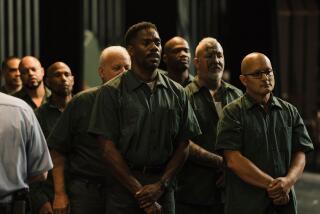Controversial Bishop’s Life Is the Focus of a New Play
The protests started as soon as playwright Colin Cox e-mailed churches to announce the opening Sunday of his new play on the life of controversial Episcopal Bishop John Shelby Spong.
“I can’t tell you how excited I was to get your e-mail,” went one sardonic reply. “I misread it and thought that Bishop Spong had died and was being memorialized in the play. Sadly, I was mistaken.”
For the record:
12:00 a.m. Oct. 9, 2005 For The Record
Los Angeles Times Sunday October 09, 2005 Home Edition Main News Part A Page 2 National Desk 1 inches; 63 words Type of Material: Correction
Episcopal cleric -- An article in Saturday’s California section about a new play about retired Episcopal Bishop John Shelby Spong mischaracterized his ordination of a woman priest. The article said Spong ordained the first Englishwoman as a priest for the Church of England. In fact, the Englishwoman, a member of the Church of England, was ordained by Spong for the U.S. Episcopal Church.
At 74, Spong, the retired bishop of Newark, N.J., continues to rile many Christians with his denial of the virgin birth, the bodily resurrection of Jesus and a God who works miracles and exacts punishment. His critics call him a heretic.
Others, however, say that Spong’s defense of ethnic minorities, women and gays as well as his skeptical take on Scripture as the literal word of God bring relevance, rationality and hope.
Now Spong’s lifelong quest to wrest himself from what he has called his fundamentalist evangelical North Carolina upbringing to understanding God in a radically different way is the subject of a sympathetic new drama, “A Pebble In My Shoe.”
The bishop plans to be at Sunday’s 5:15 p.m. premiere at the Los Angeles Theater Center, 514 S. Spring St. After the 90-minute performance, Spong will be honored at a reception. He also will sign his latest book, “The Sins of Scripture.” Other performances are scheduled for Oct. 15,16, 22 and 23.
Written and directed by Cox, the play is based on Spong’s 1999 autobiography, “Here I Stand: My Struggle for a Christianity of Integrity, Love and Equality.” It features actor Stephan Wolfert as the bishop.
Cox said Spong’s publisher, HarperSanFrancisco, approached him two years ago about writing a play about the bishop’s life. Cox, director of the Los Angeles-based Will & Co. theater ensemble, described himself in an interview as “not a religious fellow.”
“Any God who can be killed ought to be killed. That’s the message of the play and, I think, that is the message of Jack Spong,” Cox said. A biochemist by training, Cox said he was smitten by Spong’s take on Christianity and his dismissal of so many traditional views of God.
“Once I read Jack’s books, I kind of realized, here’s a man with a different point of view that seems valid to me,” Cox said. “If you’re going to be a Christian, what this man is saying makes sense.”
Spong, who has read the script, likes it. “I don’t know if I can be objective about it, but I was really moved by the play. That may be self-serving. It is a very strange thing to read a play about your own life,” he said in a telephone interview this week from his home in New Jersey.
The play traces Spong’s evolving and decidedly unorthodox ideas about God, as well as the bishop’s church-shaking decisions to ordain the first publicly acknowledged gay pastor in the Episcopal Church, and the first English woman as a priest, for the Church of England.
More than once, conservatives within the Episcopal Church brought formal charges against Spong. In 1987 and 1988, critics said he had “committed an immoral act” and failed to “defend the faith” by endorsing same-sex relationships, “even when that relationship has not been blessed with a service called holy matrimony.”
Both times, a court of bishops dismissed the charges without a trial.
It has been a life, Spong said, in which almost everything he learned as a youth growing up in North Carolina would be set on its ear. As a seminarian at the Protestant Episcopal Theological Seminary in Virginia, he was greatly influenced by the writings of the late theologian Paul Tillich, who spoke of God not in anthropocentric terms but as “being.” Later, Spong encountered a gay priest who was “neither sick nor morally depraved.”
“I had to bump up against that,” said Spong, who served as Episcopal bishop of Newark from 1976 until his retirement in 2000. “It was like a pebble in my shoe until I resolved it.” It was an insight that would give Cox the title of his play.
“I was taught that segregation was the will of God, that women were inferior to men, that it was OK to hate other religions, especially Jews,” Spong said in the interview. “And homosexuals were off the chart!”
Spong is the author of 20 books, including “Rescuing the Bible from Fundamentalism,” “Resurrection: Myth or Reality?” and “Why Christianity Must Change or Die.” He has taught at Harvard University and the Graduate Theological Union at Berkeley.
He said God is not a supernatural being who intervenes in human history. God cannot stop a tsunami or spare one of Spong’s four daughters, who is serving in the Marines in Iraq, from harm, he said.
“I pray for my daughter not because I think my prayers are going to stop her Jeep from hitting a land mine, or stop some ground-to-air missile from bringing down her helicopter. If you’re in the wrong place in the wrong time, she’s going to get what all those other kids get ... blown to smithereens. But I love her. I do know positive energy can flow from life to life and maybe make a difference.
“Some of my religious critics think I’m a heretic. I’m the most God-intoxicated person I know,” he said. Many critics, he said, might be surprised to learn that he believes in life after death. Spong said he experiences -- but does not definitively know -- God as a god of love and life. “I think God is being, and I have to live my life in such a way to enhance life for everybody,” he said.
In asserting that the Bible is not literally the “word of God,” Spong is going against the popular grain in America. A Gallup Poll found in May that 32% of the public believed the Bible was the actual word of God, and 47% more believed it was the inspired word of God
But it is not a point Spong would concede, particularly, he said, when the Bible is used to justify war as well as discrimination against women, ethnic minorities, gay men and lesbians.
“I keep sitting back and listening to my religion used to justify things I can’t justify, like amending the Constitution to ban gay marriage, and even to justify the war in Iraq,” Spong said. Violence and oppression, he said, flow from a mistaken biblical view that humankind is inherently sinful and that punishment -- divine or human -- must correct the faults. This is the central idea of the Christian teaching that Jesus died on the cross to atone for the sins of all. Spong rejects the premise.
There never was a perfect Earth before a biblical fall in the Garden of Eden, he said. Instead, he said, humanity, like the evolving universe, is a work in progress. Creation is ongoing.
“That is a very different perspective,” he continued. “There is a vast contrast between the definition of being fallen creatures and that of being incomplete creatures.” There is evil in the world and it must be addressed, he said. But it should be seen as individuals or human society not yet achieving full human maturity.
Jesus, in Spong’s view, was the first example of what it means to be fully human, so wholly infused with God’s love and spirit that he was seen as the “Son of God,” the bearer of the “Christ experience.”
“Was he divine, we ask of Jesus? Yes, but only in the sense that by living fully and freeing his new humanity he was able to enter into the realm of divinity, of God. The two cannot be separated,” Spong writes in his new book.
“The Psalmist was wrong,” Spong writes. “We were not created ‘a little lower than the angels.’ Rather, we have evolved into a status that we judge to be only a little higher than the ape’s.”
More to Read
The biggest entertainment stories
Get our big stories about Hollywood, film, television, music, arts, culture and more right in your inbox as soon as they publish.
You may occasionally receive promotional content from the Los Angeles Times.










